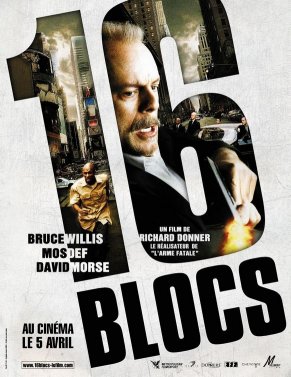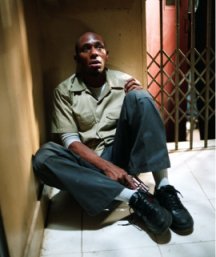|
16
Blocks
Richard Donner’s 16 Blocks is not a brilliant
film by any stretch of the imagination. It isn’t going
to profoundly change lives or knock viewers out of their
seats. In fact, in many places Donner’s film seems
to look and feel like a slew of other cop-buddy movies and
wrongly accused hero storylines that have been recycled
to no end on the silver screen.
Where
it manages to differ is, unsurprisingly, where it shines,
and these moments are thankfully peppered throughout the
film.
Beginning
with casting, Jack Mosley is no real stretch for Bruce Willis,
as he has seemingly made a career for himself out of playing
the most out of the ragged old cop trope on screen. Mosley,
however, does differ from Willis’ other work in that
his rough exterior is not simply a byproduct of hardened
years serving in the line of duty. Mosley’s past plays
a part in his demeanor, but it isn’t for the same
tired reasons we’ve seen time and time again.
The
real gems here come in the form of some excellent character
work by David Morse as Mosley’s ex-partner Frank Nugent,
and the underappreciated Mos Def who manages to steal the
show as Eddie Bunker, a man who seems to fall into the “wrongly
accused” category. Sort of.
Most
films of this ilk set up the troubled hardened veteran cop
with the need to make the tough choice of going against
the grain because of something he witnessed. This gets shifted
a bit in 16 Blocks, as Bunker is actually the witness,
and Mosley’s decision comes less from something he
sees, and more from something he has known to be true for
a longer time than he cares to admit.
Bunker
witnessed something, what we are not sure, but its enough
to put his life at risk at the hands of some of New York’s
“finest.” Mosley has a limited amount of time
to transport Bunker sixteen city blocks so that he may testify
in court, while Nugent and his cronies pursue them relentlessly.
Wisely,
the film refrains from spending too much time detailing
exactly what Bunker saw and what crimes he had actually
committed in his past. Instead, the focus for survival is
shifted away from physical escape at times, and re-centered
on characters finding hope in the chance of being able to
change in order to escape their pasts.
Sure,
the requisite chase sequences ensue, and Mosley manages
to escape the most dire situations with the prowess of uncanny
dues ex machine lingering in the foreground from time to
time, but that is nearly excusable with touches of fresh
and decently developed character development.
Mos
Def brings to Bunker not only the feeling of wrongful imprisonment,
but also the presence of a man whose past is haunted by
crime and sin yet who wholeheartedly believes that people
are capable of change. We often find that characters like
Bunker are cheaply developed into ludicrous vindication,
perhaps because people feel that in order to back a character
completely they need to be operating from a clean slate.
Yet
Donner’s film makes it a point to buck that trend,
and when he focuses on making this known, the film really
shines. Meanwhile, Morse’s ruthless pursuit of Mosley
and Bunker is both harsh and vindictive, and most of all
demanding of recognition. His motives and actions may be
based on tired recycled themes, but he is determined to
have fun while working in these archetypes and it shows.
In the
end, it is difficult to recommend 16 Blocks as
it hardly seems worthy of intentional screening. However,
if you and your friends are looking for a “not too
complex” action thriller that manages to entertain
this weekend, you could hardly go wrong with Donner’s
film.
Rating:

|








